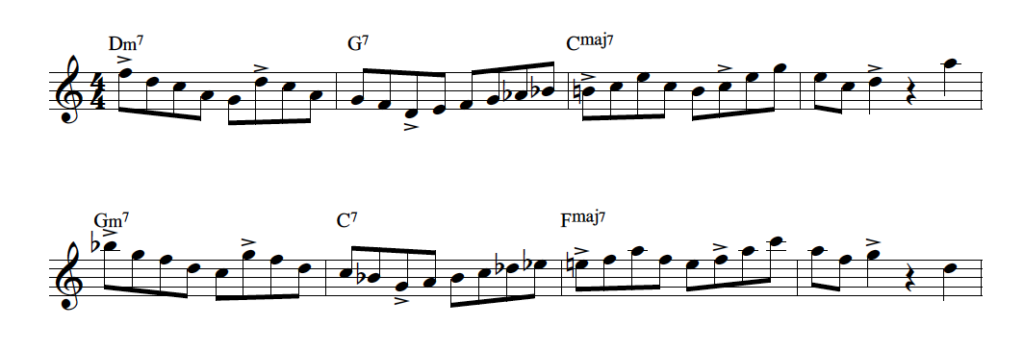
Here’s a way to use familiar sounding tonal colors and tensions in surprising new ways. By simply organizing the melodic shapes to imply various odd metered subdivisions, you can create lots if interesting rhythmic tension.
Take a look at the example above. In the first measure, I’m using an F major pentatonic scale that is ascending in two, five-note subdivisions: F-D-C-A-G; then moving up to D and ascending again: D-C-A-G-F. As you can see, these two shapes combined “go over the bar line” into the second measure. By virtue of the contour of these two pentatonic patterns, I’ve implied a subdivision of 5/8. (I’ve placed accents to mark the subdivisions, but even without them, the 5/8 feeling is clearly there when you play it.)
In the next measure, I simply ascend on the diminished scale (D-E-F-G-Ab-Bb). This ascending pattern clearly implies a 3/4 subdivision, especially as it is contrsted to the previous 5/8 subdivisions. I use the Bb of the diminished scale (functioning as the #9 of the G7 chord) to resolve to the B natural (the 7th) of the Cmaj7 chord. The line then returns to the 5/8 subdivisions, as I use the notes of the Cmaj7 chord to create a contour to imply this subdivision. In the fourth measure, I place an accent over the “D” (the 9th of the Cmaj7 chord), then add a quarter rest, followed by a quarter note (“A”). This has a net effect of both implying a 3/4 subdivision, as well as providing a “pickup” note to connect the line into the fifth measure, where the original line begins in the new key (F major).
Most definitely practice this with a metronome. Explore setting the clicks on beats one and three; two and four; beat two only; beat four only. This will give you a chance to really feel the “lopsided-ness” of the odd-metered subdivisions in relation to your imagination of the four-measure, 4/4 form that houses the ii-V7-I progression. Also, practice this with both a “straight” eighth note feel, and a swing feel. If you’d like to further explore the use of implied odd-meters over 4/4, please consider my e-book, Essential Polymeter Studies in 4/4 for the Improvising Musician. And if you’d like to discover some new ways to approach the ii-V7-I chord progression, please consider another of my e-books, ii-V7-I: 40 Creative Concepts for the Modern Improviser. For a free, downloadable pdf of this etude, click the link below:
https://billplakemusic.org/wp-content/uploads/2019/11/58-Combined-with-34-Over-ii-V7-I-in-44-1.pdf
If you would like to show your support and appreciation for my work, please consider making a small donation through the link below: